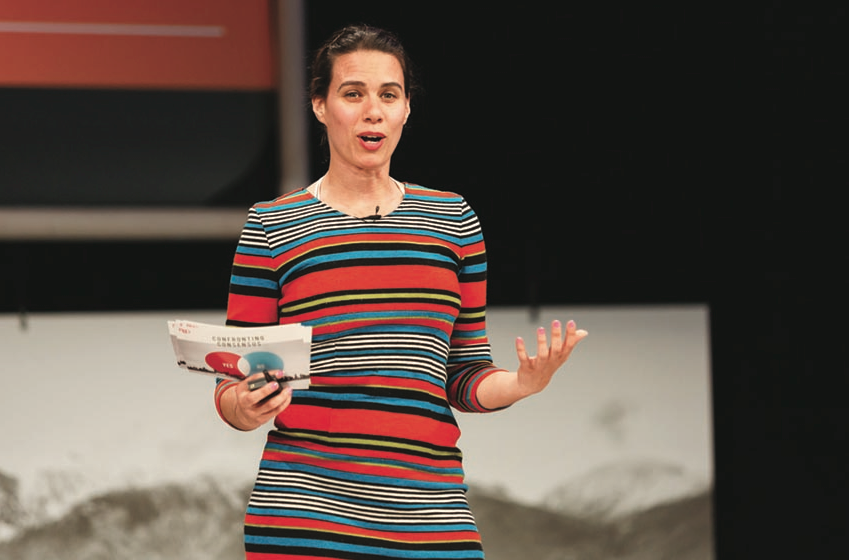Build more housing faster. That was the chorus from a trio of speakers at the recent RED (Real Estate Development) talks in Vancouver which addressed solutions to Vancouver’s high housing prices.
San Francisco pro-development advocate Sonja Trauss said it doesn’t matter what kind of housing is built as long as there is more of it, and soon.
Truass, who founded the upstart 500-member, San Francisco Bay Area Renters Federation two years ago, said that, like in her high-priced city, Vancouver’s mandatory public hearing process used to decide density “is broken.”
“The people who live near a proposed new development are the last people who should be asked if they want higher density.” Trauss told the March 30 meeting, “You are guaranteed to get a ‘no’”
Instead, Trauss, a renter, former math teacher and self-styled anarchist, tries to pack such meetings with those who will benefit from more housing: young people from other neighbourhoods who will actually buy or rent the new homes.
Her group has even sued San Francisco suburban communities that have failed to approve the housing they said they would.
Trauss said more supply is also the answer for Vancouver, whether it is luxury homes, high-rise rentals or low-income housing.
“You have to support building, even when it’s a type of building you hate,” she said. “You really need everything right now.”
A recent international survey by RentCafé found that San Francisco has the second-highest housing prices and the second-most expensive rent in the U.S., at US$3,360 for a one-bedroom. The city also has the country’s second-highest homelessness rate with 795 homeless per 100,000 residents.
As a comparison, RentCafé, a subsidiary of Point2Point Homes, ranked Vancouver at No. 24 out of 30 global cities for rent levels, with average rents of US$1,400.
Vancouver has 2,100 homeless people, according to the just-released 2017 survey, representing about 30 homeless people per 100,000 residents.
Vancouver’s obsession with a “housing crisis” may be actually overblown, said RED speaker Steven Levitt, author and partner in Freakonomics.
“High housing prices because it is a beautiful city that lots of people want to move to is a pretty good problem to have,” said Levitt, who hails from Chicago. “In my city, the current crisis is the highest murder rate in the United States.”
Increasing the inventory, which should start by reducing the regulatory costs of building new homes, would likely be a simple fix for Vancouver’s housing problem, Levitt suggested.
Paul Kershawp, a University of British Columbia professor and founder ofVancouver’s Generation Squeeze, a lobby group for millennials and gen-Xers seeking affordable housing, said some progress has been made. He cited the B.C. foreign-buyer tax, Vancouver’s recent vacant home tax and the city’s proposal to allow older houses to be converted to multi-unit rentals as steps in the right direction.
Empty home tax may be ineffective
Vancouver’s new Empty Home Tax will likely do little to increase the supply of rentals in a city with a near zero-per cent vacancy, according to housing analysts and tenant advocates.
“If a residential property is not a principal residence and does not qualify for an exemption, it must be occupied by a tenant for at least six months of the year - in periods of 30 or more consecutive days – or be subject to a 1 per cent tax on its assessed value.” according to a March 7 statement from the City of Vancouver. Owners have until July 1 to report on the property’s status.
Vancouver Mayor Gregor Robertson estimates there are 10,800 homes sitting empty in the city “and likely thousands more under-occupied.”
Based on Vancouver’s current assessed values, the 1% tax would average about $16,000 for a vacant detached house and $6,000 for a vacant condominium.
“I like the principal of it but I think owners will find a way around it,” said Brendan Dawe, a spokesman for Abundant Housing Vancouver, a year-old tenant advocacy group pushing for more rental housing to be built. Dawe believes the tax will be expensive to administer and difficult to enforce.
Michael Geller, a Vancouver architect and developer who consults on housing issues, echoed that comment.
“I suspect the Empty Homes Tax will result in some properties rented out, and others sold to owner-occupiers, or investors who will rent them out,” Geller said. “But ultimately, it will be administratively expensive and not make rental housing more affordable.”



